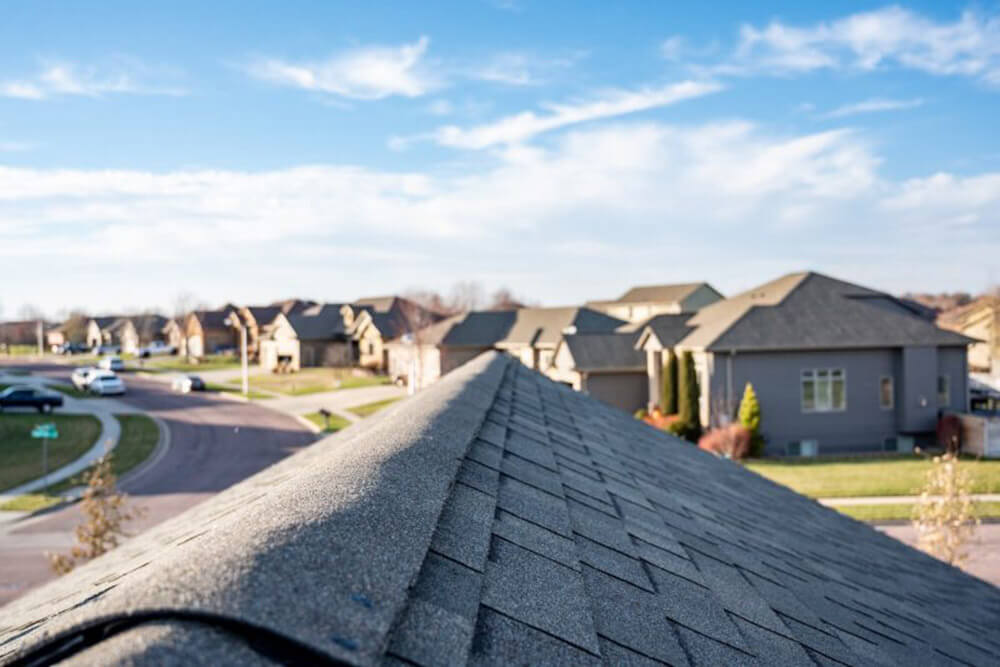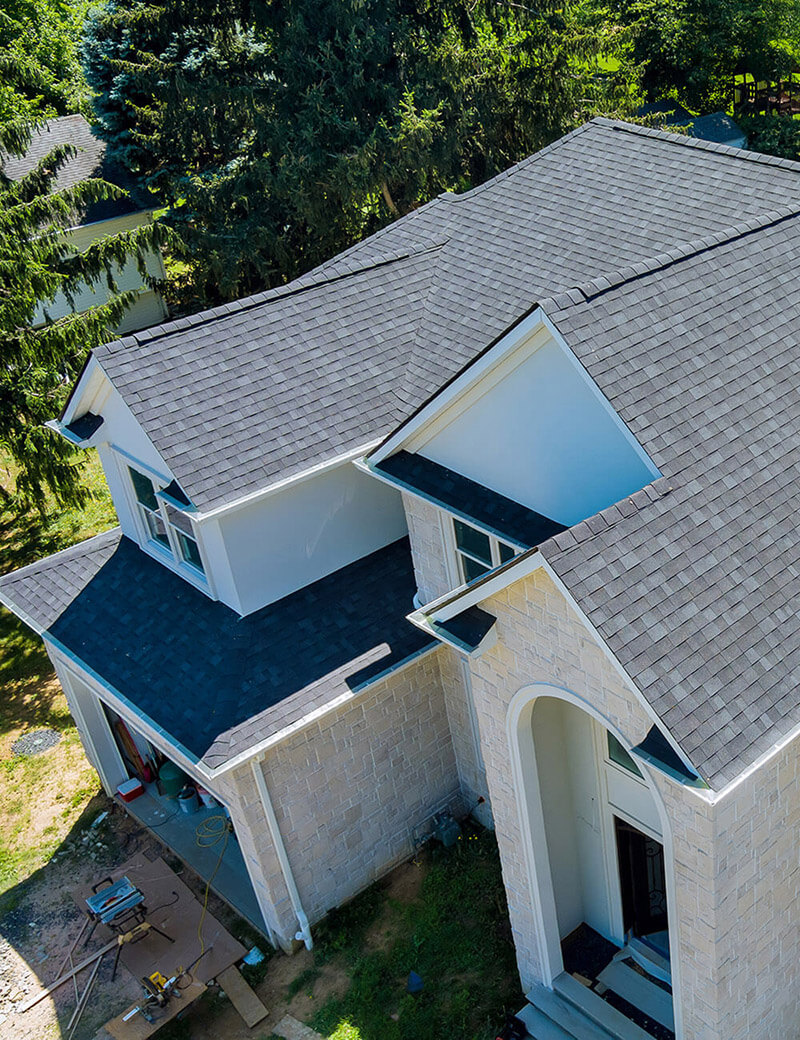ASPHALT SHINGLES
Asphalt Shingles
There are many good reasons that asphalt shingles are the No. 1 choice for roofing material in North America. They are versatile, durable, energy-efficient and last a long time. Building a new roof? Replacing an existing roof? Either way, ask the roofing experts at Hixon about the benefits of asphalt shingles for a quality roof that will last for decades.
Why choose asphalt shingles?
Asphalt roofing shingles give your home an affordable, durable roof that looks great, too. Here are some of the many reasons to choose asphalt shingles.
-
- Affordable quality: Shingles offer unmatched durability and performance for the cost. They are cost-effective upfront and provide value in the long term.
- Energy efficiency: Shingles and the underlayment Hixon installs provide excellent energy efficiency. We make sure you get the most energy-efficiency roof for the price.
- Sound protection: As part of a complete roofing system, asphalt shingles greatly reduce exterior noise.
Shingles also are easy to install and repair and are completely recyclable.
Contact Hixon today for expert installation, repair and maintenance of asphalt roofing shingles in Aiken, SC, Charleston, SC, Columbia, SC, and Augusta, GA.
Frequently Asked Questions
Q: How much do asphalt shingles cost to install in South Carolina?
A: Asphalt shingle installation in South Carolina typically costs $8,000-$15,000 for most homes, depending on size, quality, and complexity. **Cost breakdown by shingle type:** 3-tab basic shingles (we don’t recommend): $6,000-$9,000 for average home—lowest cost but poor performance and short lifespan. Architectural/dimensional shingles (most popular): $8,000-$12,000—excellent balance of cost and performance, 25-30 year warranties. Premium/designer shingles: $12,000-$18,000—lifetime warranties, enhanced aesthetics, superior wind/impact resistance. **Cost factors include:** Roof size (measured in “squares”—100 sq ft units), roof pitch/steepness (steeper roofs require more labor and safety equipment), complexity (dormers, valleys, chimneys increase labor), number of existing layers (multiple old roofs cost more to remove), decking condition (rotten wood replacement adds $500-$3,000+), and ventilation upgrades (proper ventilation is essential in SC climate). **What’s included:** Our estimates include complete tear-off, disposal fees, new underlayment, drip edge, flashing, valley materials, ridge vents, all labor, permits, and cleanup. We provide itemized quotes showing exactly what you’re paying for. The cheapest bid isn’t always the best value—improper installation or inferior materials void warranties and lead to premature failure. During your free estimate, we’ll explain quality differences and help you choose shingles that match your budget and expectations.
Q: What's the difference between 3-tab and architectural shingles?
A: Architectural (dimensional) shingles significantly outperform 3-tab shingles and are the clear choice for South Carolina homes. **3-tab shingles:** Flat, single-layer design with uniform appearance, thinner construction (less durable), 15-20 year lifespan in SC climate (heat and UV degrade them quickly), lower wind resistance (60-70 mph ratings), no dimensional appearance (flat, dated look), and limited warranties. Cost: $6,000-$9,000 installed. We rarely recommend these—they’re false economy that costs more long-term. **Architectural shingles:** Multi-layer construction creating dimensional appearance, thicker and more durable (better impact resistance), 25-30 year lifespan in SC (some with lifetime limited warranties), higher wind resistance (110-130 mph ratings—critical for our storms), better aesthetics (mimic wood shake or slate), enhanced granule coatings (algae resistance, UV protection), and comprehensive warranties including wind damage coverage. Cost: $8,000-$12,000 installed. **The value proposition:** For $2,000-$3,000 more upfront, architectural shingles last 50% longer, look significantly better, resist wind damage better (important for insurance), and come with transferable warranties that add resale value. The math is simple—architectural shingles cost less per year of protection. After 40 years installing both types, we strongly recommend architectural shingles for every South Carolina home.
Q: Are asphalt shingles recyclable?
A: Yes, asphalt shingles are 100% recyclable, and we recycle shingle tear-off materials whenever possible. Old asphalt shingles are ground up and used in new asphalt pavement for roads—the asphalt content provides excellent binding properties and reduces the amount of new petroleum-based asphalt needed. Recycling benefits include diverting millions of tons of material from landfills annually (11-13 million tons of shingles are discarded yearly in the US), reducing road construction costs by 20-30% when recycled shingles are incorporated, conserving natural resources by reducing demand for virgin materials, and lowering your project’s environmental impact. In South Carolina, recycling availability depends on local facilities and current market conditions for recycled asphalt. We work with recycling centers when available, though there’s sometimes a small fee difference versus landfill disposal. Many environmentally-conscious homeowners specifically request recycling—we’re happy to accommodate. While metal roofing has a “greener” reputation due to its longevity and higher recycling rates, asphalt shingles’ recyclability means they’re not the environmental villain they’re sometimes portrayed as. If sustainability matters to you, we can discuss both asphalt shingle recycling and alternative materials like metal roofing that offer different environmental advantages.
Q: What are the best asphalt shingle brands?
A: After 40 years installing all major brands, we primarily recommend and install GAF, Owens Corning, and CertainTeed—the top three manufacturers with proven long-term performance. **GAF (our most-installed brand):** Timberline HDZ shingles are industry-leading with LayerLock technology for superior wind resistance (130 mph), algae resistance (StainGuard Plus), and comprehensive warranties. GAF’s Golden Pledge warranty (available through Master Elite contractors like Hixon’s) covers materials, labor, and workmanship for 25-50 years. We’re GAF Master Elite certified, which requires rigorous training and quality standards. **Owens Corning:** Duration and Oakridge shingles offer excellent performance with SureNail technology for better wind resistance, TruDefinition color granules for enhanced aesthetics, and strong warranty programs. Their “Platinum Protection” warranty system provides comprehensive coverage. **CertainTeed:** Landmark and Presidential shingles deliver solid performance with advanced polymer-modified asphalt formulation and good warranty coverage. All three brands use similar technologies—algae-resistant granules (essential for SC humidity), Class A fire ratings, impact-resistant options (Class 4 for insurance discounts), and dimensional designs with excellent aesthetics. **Why brand matters:** Cheaper brands often use thinner shingles, lower-quality asphalt, inferior granule adhesion, and limited warranty coverage. The $1,000-$2,000 savings isn’t worth the risk of 5-10 year shorter lifespan. We only install brands we trust on our own homes.
Q: What is impact-resistant roofing and should I get it?
A: Impact-resistant (Class 4 or IR) asphalt shingles have enhanced construction that better withstands hail and flying debris. They feature a modified asphalt formulation with SBS (Styrene-Butadiene-Styrene) polymer for flexibility, reinforced mat design for better structural integrity, and specialized surface treatments. These shingles pass UL 2218 Class 4 impact testing—surviving direct hits from 2-inch steel balls dropped from 20 feet. **Benefits for South Carolina homeowners:** Better hail protection (SC experiences occasional severe hail events), 10-25% insurance premium discounts (check with your specific insurer—many SC companies offer substantial discounts), longer lifespan (the enhanced construction ages better even without hail), improved wind resistance (stronger construction handles storms better), and better warranty coverage (often includes enhanced hail damage provisions). **Cost vs. value:** IR shingles add $1,000-$2,500 to project costs for typical homes. However, if insurance discounts are 15%, you recover this premium in 5-8 years through reduced premiums, then continue saving for the life of the roof. Beyond financial benefits, IR shingles provide peace of mind during severe weather—less likely to need replacement after storms. **When IR makes sense:** Homes with previous hail damage, areas with known hail risk (parts of upstate SC experience more hail), homes seeking insurance discounts, and properties where storm protection justifies the premium. **Bottom line:** For most SC homeowners, impact-resistant shingles deliver excellent value through insurance savings alone, plus superior storm protection.
Q: Do asphalt shingles keep your house cool in South Carolina summers?
A: While asphalt shingles absorb heat, modern cool-roof shingles and proper installation can significantly reduce cooling costs in South Carolina’s brutal summers. **How shingles affect temperature:** Traditional dark shingles absorb 80-90% of solar energy, raising roof temperatures to 150-170°F. This heat transfers to your attic (reaching 130-150°F without proper ventilation), increasing cooling load and energy costs by 15-25%. **Cool-roof technology:** Modern architectural shingles use specially engineered granules with higher solar reflectance, reflecting 25-40% of solar energy (versus 10-15% for standard dark shingles). Light-colored cool-roof shingles can reduce roof temperature by 20-30°F, translating to 10-20% cooling cost savings—$150-300 annually for average SC homes. GAF’s Timberline Cool Series, Owens Corning’s Duration Cool shingles, and similar products qualify for ENERGY STAR ratings and some utility rebates. **Color matters:** Light colors (whites, tans, light grays) reflect more heat than dark colors (blacks, dark browns). However, even “cool technology” dark shingles outperform traditional dark shingles. **The ventilation factor:** Proper attic ventilation matters more than shingle choice. Ridge and soffit vents creating continuous airflow can reduce attic temperatures by 30-40°F regardless of shingle type. We ensure every installation has adequate ventilation—it’s the single most important factor for both cooling costs and shingle longevity. During your consultation, we’ll discuss color options and cool-roof technology if energy efficiency is a priority.
Q: Do asphalt shingles require maintenance?
A: Asphalt shingles require minimal but important maintenance to achieve their full lifespan. **Annual maintenance tasks:** Visual inspection from ground level (use binoculars—never walk on your roof) checking for missing, curling, or damaged shingles; loose or damaged flashing around chimneys and vents; clogged gutters causing water backup; overhanging tree branches that could fall; and signs of algae or moss growth (black streaks or green patches). Clean gutters 2-3 times yearly (more if you have trees). Remove debris from valleys and roof surface. Trim tree branches within 6-10 feet of roof. **Professional inspections:** Schedule professional inspections every 2-3 years for roofs under 15 years old, annually for roofs 15+ years old. After major storms (high winds, hail, fallen branches), professionals spot problems invisible from ground level. **What to avoid:** Never pressure wash asphalt shingles (strips protective granules), walk on your roof unnecessarily (creates compression damage and safety risks), or allow moss/algae to persist (damages shingles and shortens lifespan). **Repairs to address promptly:** Missing shingles expose underlayment to weather damage, damaged flashing causes leaks that worsen rapidly, and lifted shingles will tear off in next storm. Small repairs ($200-500) prevent major problems ($2,000-8,000+). We offer maintenance inspection services and can address minor issues before they become expensive emergencies. Neglected roofs fail at 15-18 years; maintained roofs reach 25-28 years—maintenance pays for itself many times over.
Q: Can you match my existing shingle color for additions or repairs?
A: Matching existing shingles is challenging because shingle colors change over time due to weathering, UV exposure, granule loss, and algae/discoloration. However, we have several strategies: **For recent installations** (0-5 years old): We can often match exactly if we know the manufacturer, color name, and product line. Bring us a shingle or clear photo—we’ll identify it and source matching materials. New shingles will look brighter than weathered ones initially but will blend within 6-12 months as they weather. **For older roofs** (5-15 years): Exact matching is difficult because your original color has faded and new shingles will be noticeably different. We can find the closest available match, but expect visible differences. Consider whether partial replacement makes sense versus full replacement—sometimes patch repairs create patchwork appearance that diminishes curb appeal. **For very old roofs** (15+ years): Your shingle color/style may be discontinued. We’ll find the closest match in current product lines, but it won’t be perfect. At this age, consider whether full replacement makes more sense—if your roof needs significant repairs, you’re approaching replacement age anyway. **Strategic approaches:** Place new shingles on less-visible roof sections when possible. Use transitions like valleys or hips as natural break points between old and new. Consider full replacement on visible sections (front of house) while keeping matching existing shingles on back. During your inspection, we’ll show you options and discuss whether matching, full replacement, or other approaches serve your situation best. We’re honest about what’s achievable rather than overpromising on matching capabilities.


